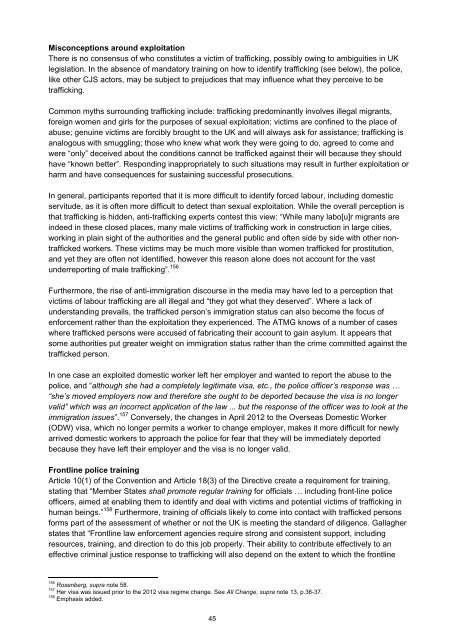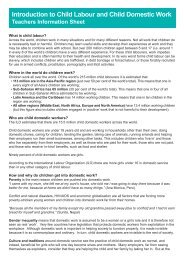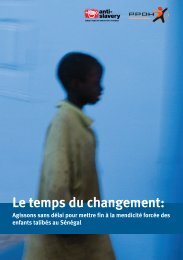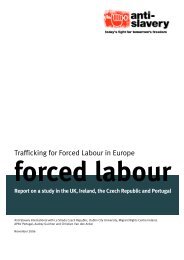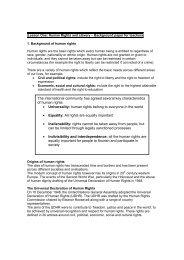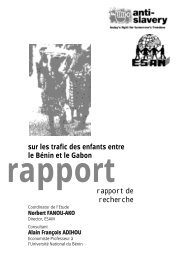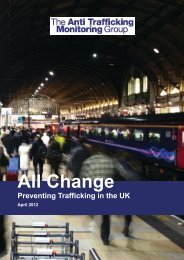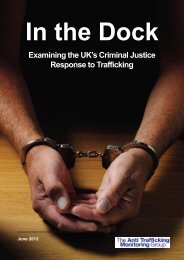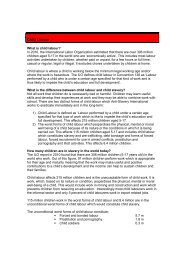that <strong>the</strong>ir problem was a civil matter and not a police concern. It was only after an intervention by <strong>the</strong>Metropolitan Police Service Trafficking and Prostitution Unit (SCO9) that <strong>the</strong> complaints were handledappropriately.<strong>In</strong> ano<strong>the</strong>r case presented by a legal representative, a south Asian trafficked person attempted toreport labour trafficking to <strong>the</strong> police, wishing to give details of <strong>the</strong> trafficker whom he claimed wasexploiting o<strong>the</strong>rs. He attended a police station in Manchester and ano<strong>the</strong>r in Leeds. <strong>In</strong> both instances,he was refused assistance and advised that it was an immigration matter and thus should be dealtwith by <strong>the</strong> Home Office.These situations may arise because trafficked persons, as one law enforcement officer stated, will notsay “<strong>the</strong> golden words: ‘I’m a victim of human trafficking!’” Victims may approach <strong>the</strong> police to reportthat <strong>the</strong>ir employer withholds <strong>the</strong>ir passport and wages or because <strong>the</strong>y wish to return home. Thesemay seem to be civil matters, however, <strong>the</strong>y are also indicators of trafficking and/or forced labour andshould <strong>the</strong>refore prompt fur<strong>the</strong>r inquiries. However, even if officers are not familiar with traffickingindicators, <strong>the</strong>y should be able to identify o<strong>the</strong>r crimes. For example, it is a criminal offence to withholdsomeone else’s passport, which is a common occurrence in trafficking cases.Identifying trafficking in <strong>the</strong> communityPolice working on <strong>the</strong> frontline, such as police community support officers (PCSOs), also appear tohave difficulty in identifying trafficking. <strong>In</strong> one instance presented to <strong>the</strong> ATMG, <strong>the</strong> police were calledto premises where a woman was behind a locked door. Though <strong>the</strong>y were suspicious of <strong>the</strong>circumstances, <strong>the</strong>y left without seeing <strong>the</strong> woman or determining whe<strong>the</strong>r <strong>the</strong> door was locked from<strong>the</strong> outside. Fortunately, after <strong>the</strong> officers were instructed to return it materialised that this was not acase of trafficking; however, this incident serves to highlight <strong>the</strong> police’s lack of confidence inidentifying potential trafficking indicators, coupled with, as one officer stated, pressure to get to <strong>the</strong>next job.<strong>In</strong> ano<strong>the</strong>r case uniformed officers attended a site from where trafficking complaints were made. Thisis problematic as <strong>the</strong> exploiters are often in <strong>the</strong> vicinity of <strong>the</strong> trafficked persons, rendering <strong>the</strong>munable to disclose for fear of imminent reprisals. It is good practice to speak to trafficked personsaway from <strong>the</strong> premises to reduce <strong>the</strong> trafficker’s hold over <strong>the</strong>m, and to have plain clo<strong>the</strong>d officersattend. Working with representatives of specialised agencies or NGOs at <strong>the</strong> site helps to counteractany fears that <strong>the</strong> trafficked persons may have of <strong>the</strong> police. <strong>In</strong> such raids or strikes, experiencedpolice stated that it is good practice to involve interpreters to be able to establish effectivecommunication from <strong>the</strong> outset.Similarly, a report of potential mistreatment of workers resulted in law enforcement officers attending<strong>the</strong> workers’ accommodation. Unfortunately, <strong>the</strong> officers concluded that although living conditionswere far from adequate and heavily overcrowded, it was a marked improvement than what <strong>the</strong>workers were used to. This shows that both a lack of knowledge as well as cultural assumptionsinform decision-making and potentially lead to adverse consequences for trafficked persons.Overcrowding is listed as one of <strong>the</strong> indicators of forced labour, included in guidance, such as <strong>the</strong> ILOindicators 154 and <strong>the</strong> Ministry of Justice’s Circular 2010/07 Slavery, servitude and forced orcompulsory labour: Implementation of section 71 of <strong>the</strong> Coroners and Justice Act. 155154ILO, supra note 124.155Circular, supra note 123.44
Misconceptions around exploitationThere is no consensus of who constitutes a victim of trafficking, possibly owing to ambiguities in UKlegislation. <strong>In</strong> <strong>the</strong> absence of mandatory training on how to identify trafficking (see below), <strong>the</strong> police,like o<strong>the</strong>r CJS actors, may be subject to prejudices that may influence what <strong>the</strong>y perceive to betrafficking.Common myths surrounding trafficking include: trafficking predominantly involves illegal migrants,foreign women and girls for <strong>the</strong> purposes of sexual exploitation; victims are confined to <strong>the</strong> place ofabuse; genuine victims are forcibly brought to <strong>the</strong> UK and will always ask for assistance; trafficking isanalogous with smuggling; those who knew what work <strong>the</strong>y were going to do, agreed to come andwere “only” deceived about <strong>the</strong> conditions cannot be trafficked against <strong>the</strong>ir will because <strong>the</strong>y shouldhave “known better”. Responding inappropriately to such situations may result in fur<strong>the</strong>r exploitation orharm and have consequences for sustaining successful prosecutions.<strong>In</strong> general, participants reported that it is more difficult to identify forced labour, including domesticservitude, as it is often more difficult to detect than sexual exploitation. While <strong>the</strong> overall perception isthat trafficking is hidden, anti-trafficking experts contest this view: “While many labo[u]r migrants areindeed in <strong>the</strong>se closed places, many male victims of trafficking work in construction in large cities,working in plain sight of <strong>the</strong> authorities and <strong>the</strong> general public and often side by side with o<strong>the</strong>r nontraffickedworkers. These victims may be much more visible than women trafficked for prostitution,and yet <strong>the</strong>y are often not identified, however this reason alone does not account for <strong>the</strong> vastunderreporting of male trafficking”. 156Fur<strong>the</strong>rmore, <strong>the</strong> rise of anti-immigration discourse in <strong>the</strong> media may have led to a perception thatvictims of labour trafficking are all illegal and “<strong>the</strong>y got what <strong>the</strong>y deserved”. Where a lack ofunderstanding prevails, <strong>the</strong> trafficked person’s immigration status can also become <strong>the</strong> focus ofenforcement ra<strong>the</strong>r than <strong>the</strong> exploitation <strong>the</strong>y experienced. The ATMG knows of a number of caseswhere trafficked persons were accused of fabricating <strong>the</strong>ir account to gain asylum. It appears thatsome authorities put greater weight on immigration status ra<strong>the</strong>r than <strong>the</strong> crime committed against <strong>the</strong>trafficked person.<strong>In</strong> one case an exploited domestic worker left her employer and wanted to report <strong>the</strong> abuse to <strong>the</strong>police, and “although she had a completely legitimate visa, etc., <strong>the</strong> police officer’s response was …“she’s moved employers now and <strong>the</strong>refore she ought to be deported because <strong>the</strong> visa is no longervalid” which was an incorrect application of <strong>the</strong> law ... but <strong>the</strong> response of <strong>the</strong> officer was to look at <strong>the</strong>immigration issues”. 157 Conversely, <strong>the</strong> changes in April 2012 to <strong>the</strong> Overseas Domestic Worker(ODW) visa, which no longer permits a worker to change employer, makes it more difficult for newlyarrived domestic workers to approach <strong>the</strong> police for fear that <strong>the</strong>y will be immediately deportedbecause <strong>the</strong>y have left <strong>the</strong>ir employer and <strong>the</strong> visa is no longer valid.Frontline police trainingArticle 10(1) of <strong>the</strong> Convention and Article 18(3) of <strong>the</strong> Directive create a requirement for training,stating that “Member States shall promote regular training for officials … including front-line policeofficers, aimed at enabling <strong>the</strong>m to identify and deal with victims and potential victims of trafficking inhuman beings.” 158 Fur<strong>the</strong>rmore, training of officials likely to come into contact with trafficked personsforms part of <strong>the</strong> assessment of whe<strong>the</strong>r or not <strong>the</strong> UK is meeting <strong>the</strong> standard of diligence. Gallagherstates that “Frontline law enforcement agencies require strong and consistent support, includingresources, training, and direction to do this job properly. Their ability to contribute effectively to aneffective criminal justice response to trafficking will also depend on <strong>the</strong> extent to which <strong>the</strong> frontline156Rosenberg, supra note 58.157Her visa was issued prior to <strong>the</strong> 2012 visa regime change. See All Change, supra note 13, p.36-37.158Emphasis added.45
- Page 1 and 2: In the DockExamining the UK’s Cri
- Page 3 and 4: AcknowledgementsThis report was mad
- Page 5 and 6: PrefaceIn May 2009, a group of nine
- Page 7 and 8: Misconceptions around exploitation
- Page 9 and 10: Acronyms and abbreviations frequent
- Page 11 and 12: Executive SummaryIn the Dock is The
- Page 13 and 14: Furthermore, the current legislatio
- Page 15 and 16: The ATMG was made aware of some cas
- Page 17 and 18: • Introduce mandatory child-speci
- Page 19 and 20: • The UK’s ability to meet the
- Page 21 and 22: Traffickers’ primary motivation i
- Page 23 and 24: • Money launderers - turn profits
- Page 25 and 26: out to perpetuate the exploitative
- Page 27 and 28: [their] own enslavement” is as fu
- Page 29 and 30: Chapter 2: UK Anti-Trafficking Legi
- Page 31 and 32: nationals who commit trafficking of
- Page 33 and 34: Like the SOA, the “act” element
- Page 35 and 36: (b) D requires another person to pe
- Page 37 and 38: Forced or compulsory labourThe defi
- Page 39 and 40: ConclusionAs a consequence of the s
- Page 41 and 42: concerningly, the number of convict
- Page 43 and 44: women who were recruited in Poland
- Page 45: Chapter 4: Identifying trafficking
- Page 49 and 50: espond inadequately to a trafficked
- Page 51 and 52: multi-agency teams was described by
- Page 53 and 54: Josie Connors. 179 In summary, inte
- Page 55 and 56: defending a trafficked person for f
- Page 57 and 58: “[B]ecause the NRM decision is on
- Page 59 and 60: PTSD. 196 A Consultant Psychiatrist
- Page 61 and 62: etween the client and the police, i
- Page 63 and 64: Regular communication needs to be s
- Page 65 and 66: Priority planningA particular issue
- Page 67 and 68: Chapter 6: Multi-agency and interna
- Page 69 and 70: canvassing for tarmacking opportuni
- Page 71 and 72: Despite this, it would appear that
- Page 73 and 74: Good practice - Operation Golf 229O
- Page 75 and 76: Chapter 7: Criminal proceedingsThe
- Page 77 and 78: Law enforcement working on the case
- Page 79 and 80: trafficking require particular unde
- Page 81 and 82: JuryPractitioners suggested that th
- Page 83 and 84: years”. 258 Ambiguity within the
- Page 85 and 86: officer stated that not all judges
- Page 87 and 88: jurors to be assisted with expert e
- Page 89 and 90: Good feedback was received from sem
- Page 91 and 92: The Convention does recognise that
- Page 93 and 94: Another option for trafficked victi
- Page 95 and 96: There are two models with respect t
- Page 97 and 98:
1. Is there clear evidence that the
- Page 99 and 100:
decision can be taken into account
- Page 101 and 102:
also entails being “alert to the
- Page 103 and 104:
In some cases concerns were even ra
- Page 105 and 106:
Chapter 9: Prosecuting child traffi
- Page 107 and 108:
However, many children are not refe
- Page 109 and 110:
trafficking”. 352 It states: “W
- Page 111 and 112:
Previous research has found that th
- Page 113 and 114:
children as well as assisting in pr
- Page 115 and 116:
Child trafficking trainingThere is
- Page 117 and 118:
were too traumatic to involve them
- Page 119 and 120:
committed by a child whilst in a co
- Page 121 and 122:
• Introduce mandatory child-speci
- Page 123 and 124:
IdentificationThe PSNI is the main
- Page 125 and 126:
participants suggest that this is b
- Page 127 and 128:
The PPS stated that the reasons for
- Page 129 and 130:
this research was aware of potentia
- Page 131 and 132:
convictions of traffickers prosecut
- Page 133 and 134:
Possibly in response to certain hur
- Page 135 and 136:
espectively. In addition to custodi
- Page 137 and 138:
Conclusion and RecommendationsThe A
- Page 139 and 140:
CRIMINAL PROCEEDINGS• Ensure that
- Page 141 and 142:
Crown Prosecution Service, Legal Gu
- Page 143 and 144:
Herman. J. Trauma and Recovery: The
- Page 145 and 146:
Annex I: Trafficking and other form
- Page 147 and 148:
(a) on summary conviction, to impri
- Page 149 and 150:
(b) which country is the country of
- Page 151 and 152:
2009 Istvan Kalocsai (Snr)MetS.57 o
- Page 153 and 154:
2009 causing actual bodily harm, su
- Page 155 and 156:
Skirmantas Kvedaras Feed, 2010 Rape
- Page 157 and 158:
2012 Ahdel Ali (24)Mubarek Ali (29)
- Page 159 and 160:
Annex III: The CPS’s Seven Stages
- Page 161 and 162:
159


